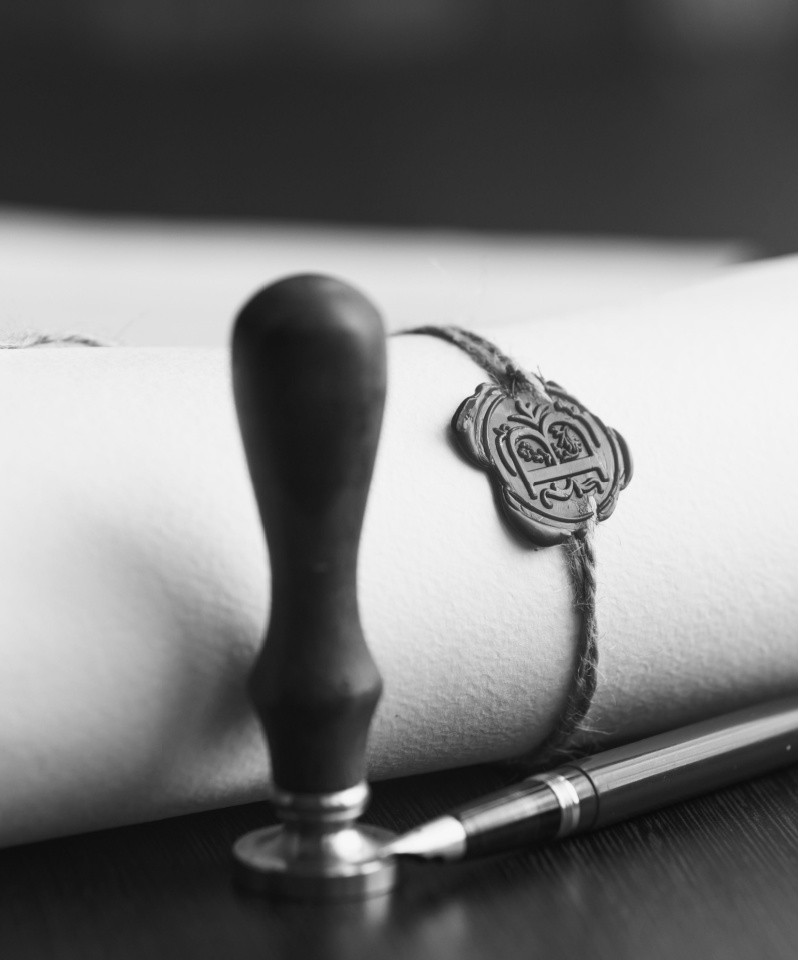A brief introduction
In the section that deals with the laws of inheritance, the Torah states (Bamidbar 27:8) that where there are sons and daughters, it is only the sons who inherit after the parents’ passing.
Likewise, the wife, according to Torah law, would not be entitled to receive any of the inheritance from the husband after his death. However, in both the above cases the male heirs are obligated to look after their female siblings with food, clothing and shelter until they reach maturity or marry, including receiving a dowry of up to 10% of the estate. The wife too, even if she is not their mother, must be looked after with food, clothing and shelter until she remarries or receives her Ketuba (the marriage contract in which the husband obligates himself to pay the wife a substantial amount of money upon divorce or death). Only in the absence of any male heirs would the inheritance go over to the daughters 1.
Another significant difference between the Torah law and the civil law of inheritance is in the case of adoption. According to the Torah law, an adopted son or daughter is not eligible to receive any of the inheritance with the biological children, whilst according to the civil law the adopted children are entitled to split equally with the biological heirs.
If civil law clashes with the Torah law
If, for example one were to write only a civil will, bequeathing to the daughters an equal share with the sons and the sons are not in agreement with this, then Halachically according to many opinions2 , the daughters would not be entitled to the share bequeathed to them. Consequently, whatever the daughters receive (in accordance with the civil will) constitutes ‘stealing’ from the sons, who are the rightful Torah heirs. In fact, according to the opinion of Rabbi Zalman Nechemya Goldberg, of blessed memory, it is incumbent upon the daughters to do everything necessary, such as the signing of any documents, to ensure that the Torah heirs (the male heirs) receive what is due to them in accordance with the Torah law, considering this to be fulfilling the Mitzva of ‘Hashavat Aveida’ (returning a lost item that belongs to a friend).
The concept of ‘Dina D’malchuta Dina’ (the state’s laws are considered law according to the Torah) would not be applicable here in the case of inheritance3 . Whilst one should certainly be writing a civil will4 so as to ensure that the instructions will be executed in accordance with the wishes of the testator, nonetheless should the beneficiaries be other than the Torah heirs, then according to the Jewish law this will not take effect, if the Torah heirs are not agreeable to hand over parts of the inheritance.
Among the reasons why the civil will won’t take effect Halachically is, firstly, since ‘bequeathal’ (the legal term used in the civil will) means transferring ownership after one’s death, and according to the Torah law, one simply does not have the ability or power to transfer ownership after one’s death. Secondly, much of the estate may consist of assets which only come into existence after one’s death (e.g. life insurance policies5 , or debts which are only collected after the testator’s death etc.) on which an acquisition cannot take effect.
Transferal of assets during one’s lifetime
The easiest way to avoid the above situation, would be to transfer one’s estate to the beneficiaries during one’s lifetime, which would certainly be binding in accordance with Torah law, but is not advisable. What would happen if, G-d forbid one were to have a farribel with the children after one has transferred all one’s estate to them! There’s a good chance that one would be left without a home! Or what would happen if one of the parents would have to undergo an expensive medical procedure, in which case the children may be reluctant to spend the money.
Therefore, this option, though being perhaps the simplest way to deal with the issue, is certainly not the most sensible one6 .
Mitzva to fulfil the testator’s wishes
Whilst the concept of the Mitzva to fulfil the deceased’s wishes is mentioned in the tractate of Gittin (14b) and is also cited in the Shulchan Aruch (252:2), nonetheless, for this to be binding, one would be required to hand over the estate to a trustee during one’s lifetime. Furthermore, if the Torah heirs were to sell parts of the estate ‘belonging’ to the daughters according to the civil will, against the instructions of the deceased, their sale would be effective since ‘Mitzva Lekayeim Divrei Hamet’ is not an actual acquisition or transferal to the daughters, rather just a Mitzva which is something appropriate for the heirs to fulfill7 .
Shtar Chatzi Zachar
One of the easiest methods to deal with this situation, would be to draw up an Addendum to the last civil will and testament, based on the idea commonly known as a Shtar Chatzi Zachar. The Shtar Chatzi Zachar (literally a document where the beneficiary inherits half the amount that the son inherits, but it can apply just as well to a case where the wish of the father is that the beneficiary splits equally with the son8 ) is a document which was often written in Europe during the middle-ages as a dowry (‘nedunya’) for the unmarried daughter. Accordingly, the daughter would be eligible to receive half the amount that the son would inherit, upon the death of the father, as her dowry.
This would serve as an attractive incentive to the prospective son in law to take the hand of the daughter in marriage; since eventually he would be eligible to inherit (via his wife to be) half of what the son/brother-in-law would be inheriting. The father-in-law would obligate himself with a substantial debt towards his daughter, equal or more than the amount that she would receive in her share of the inheritance.
However, she would be entitled to this amount of this debt only if the Torah heir (that is, the son) refuses to transfer half the inhertance to the daughter. Should the Torah heir however, transfer half the amount of what he would be receiving to his sister/the daughter, the debt would be waived. Thus, the Torah heir, in order to free himself from the debt (which otherwise remains binding on him as inheritor and is claimable from the estate) will be willing to honour the agreement and hand over an amount, equal to half his share, or his full share, depending on the agreement, to his sister/the daughter.
Similarly, nowadays, one would be able to set up a similar arrangement, with a conditional obligation as above, where the obligation would be set out in such a way that should the Torah heirs fail to comply with the last secular will (allowing the testator thereby to change the will, as is often the case!) then the Torah heirs will be left with a large debt owed to the beneficiaries listed in the secular will. Once again, this will cause the Torah heirs to comply with the secular will, so that all debts of the testator will be waived. The debt that the testator obligates himself to, must obviously be, as mentioned above, approximately the value of the entire estate or more, or at least close to that value, as otherwise, the Torah heirs may choose to settle the debt rather than having to relinquish their inheritance.
This way too, all policies, bank accounts, repayable debts etc. are all able to be included in this arrangement, even though it would be difficult to transfer these with a Kinyan (Halachic acquisition) but with the above method this poses no problem whatsoever. Using this method, the civil will can be implemented Halachically according to all opinions and is acceptable to any Beth Din in the world.
Should one ideally deviate from the Torah’s laws of inheritance?
Though we find in the Tractate of Ketubot (53a) that someone who overpays his daughter with too great a dowry, is frowned upon (‘avu’re achsanta’ the passing of inheritance from the Torah heirs to others) and should be avoided, nevertheless, many of the Halachic authorities are of the opinion that today, it is important that the daughters do receive a fair share of the inheritance, and so long as there is a valid reason for doing so, this arrangement is permitted.
This is largely because we seek to avoid any rift in the family that could result in today’s society, from the daughters being excluded from receiving a portion of the inheritance9 . Moreover, in many instances it is the daughters who would be the ones to have served the parent in a most outstanding manner, when the father or mother were no longer able to look after themselves.
This dedication, in itself, can well merit the daughters to even be paid for the services, and certainly not to be excluded from the inheritance. Furthermore, in some instances, the daughter’s family may be in dire need of money which would then also classify the bequeathal of some of the estate to the daughter (using the above device of Shtar Chatzi Zachar) as a Mitzvah of Tzedakah10. Notwithstanding the above, in order to ensure that this arrangement will definitely not be ‘frowned upon’ by Chazal, one should set aside a significant amount (something in the region of at least R10 000) to be divided exclusively among the Torah heirs and to split it, in accordance with the strict Torah law of inheritance11, including also the first born male receiving a double portion. This too, should then be included in the civil will.
Notes
2. See however Achiezer (3:34, 4:66) and Igrot Moshe (Even Ha’ezer 1:104,105) who do validate the civil will even Halachically, though many authorities disagree, see Pitchei Choshen Yerusha V’Ishut Ch. 4, note 69 and 77.
3. See Beit Yosef (CM 26) who quotes the famous Teshuvot Ha’Rashba which negates using Dina D’mulchuta Dina (DDD) in such instances. One of the reasons being, as mentioned further in the article, that DDD is only able to substitute an acquisition of the Torah, but not to create a situation of being able to transfer one’s assets after one’s death (bequeathal), when according to the Torah law this is impossible, see above Igrot Moshe mentioned in note 2.
4. See Minchat Yitzchok 6:164.
5. See Cheshev Ha’efod (3:50) who argues that life insurance may not be considered part of the inheritance.
6. See however ‘The Jewish Law of Inheritance’ where the author Rabbi Suchard, finds a way to partially overcome this problem. See also Pitchei Choshen Yerusha V’ishut Ch.4:30-32.
7. See Cheshev Ha’efod (2:106) who justifies certain civil wills in accordance with this principle, since an executer is always appointed during the lifetime of the testator, which can perhaps be considered ‘deposited’ in the hands of a trustee during one’s lifetime.
8. See K’tzot Hachoshen 33:3 that mentions a case of a Shtar Shalem Zachar.
9. Just to point out that it is not that the laws of the Torah have changed in any way, rather the social conditions have changed and the Torah itself provides the necessary means to allow for such change. The above method of the Shtar Chatzi Zachar serves as a good example to this principle.
10. See Hayashar V’hatov volume 7, written by Rabbi Zalman Nechemya Goldberg.
11. See Ktzot HaChoshen 282:2, in the name of the Tashbatz; see also Igrot Moshe ( Even H’ezer 1:110 ) who suggests one leave one’s own house to be split in accordance with the strict Torah law of inheritance. See also further Teshuvot (CM 2:49,


